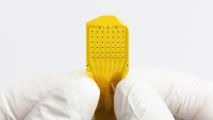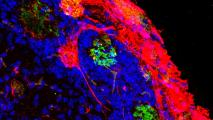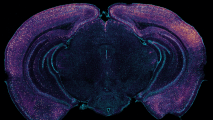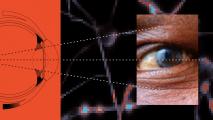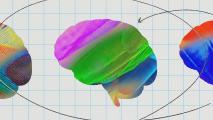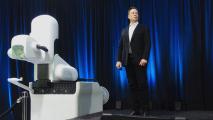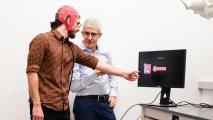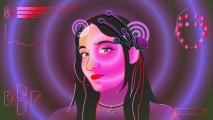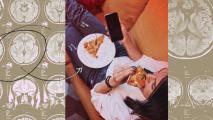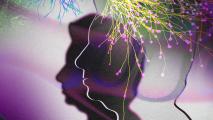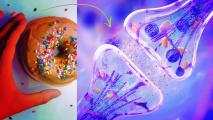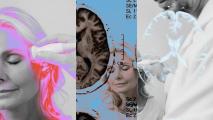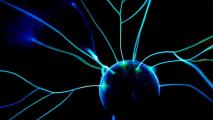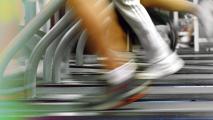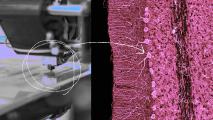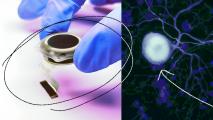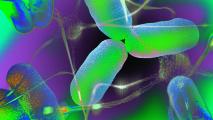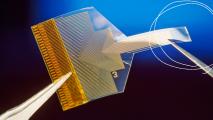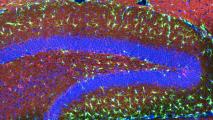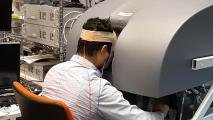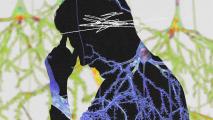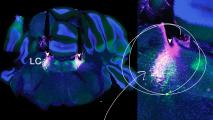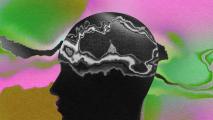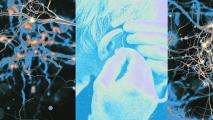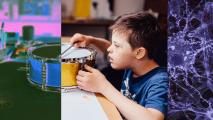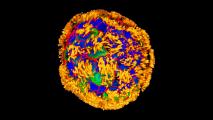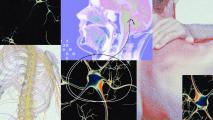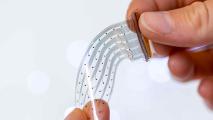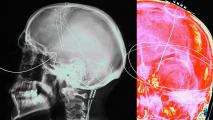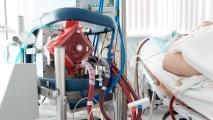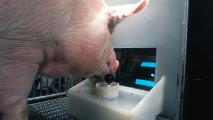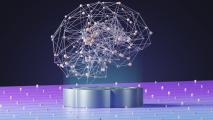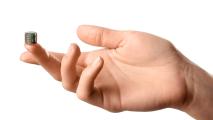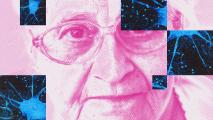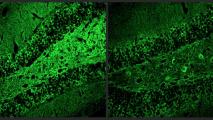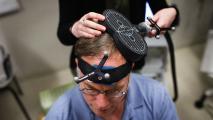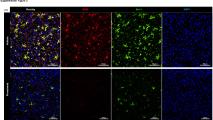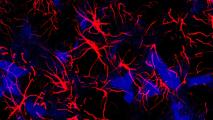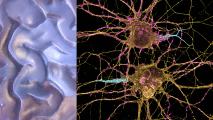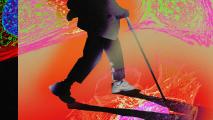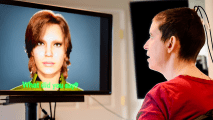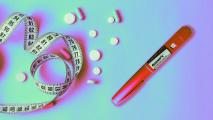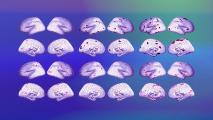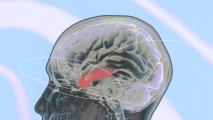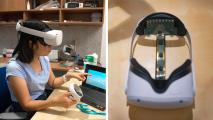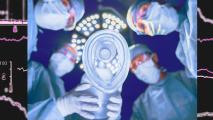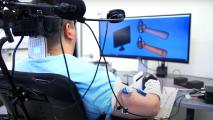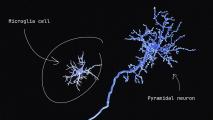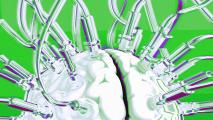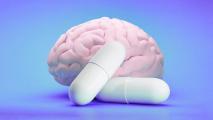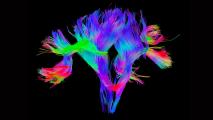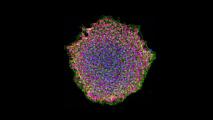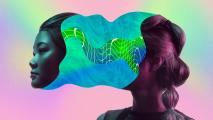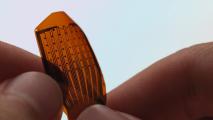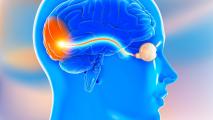Field: Neuroscience
Living longer — and healthier — starts with boosting your brain
Science is beginning to unravel the reasons behind age-related cognitive decline — and what we can do about it.
Why AI gets stuck in infinite loops — but conscious minds don’t
Anil Seth suggests the difference is that living beings are rooted in time and entropy, a grounding that may be essential for consciousness.
Inside a neuroscientist’s quest to cure coma
Thousands of Americans are trapped in disorders of consciousness. Neuroscientist Daniel Toker is searching for a way out.
Flexible brain implant takes major leap forward
The FDA’s clearance of Precision Neuroscience's flexible electrode array pushes the startup ahead in the race to BCI commercialization.
How Neuralink’s chief competitor is tapping into the brain without surgery
Synchron’s brain-computer interfaces do not require brain surgery, but travel to the brain through the jugular.
The exciting research that may cure Parkinson’s
GeneCode is developing a drug it hopes won't just alleviate Parkinson's symptoms but also protect and restore patient's neural health.
What hybrid mouse/rat brains are showing us about the mind
Modified mice with hybrid brains that include rat neurons could one day lead to new breakthroughs in neuroscience.
How sensory gamma rhythm stimulation clears amyloid in Alzheimer’s mice
Study finds stimulating a brain rhythm with light and sound increases peptide release from interneurons, possibly slowing Alzheimer's progression.
Brain implant for “artificial vision” is still working after 2 years
A new type of brain implant technology has given a man with total blindness a kind of “artificial vision.”
Why a neurodivergent team will be a golden asset in the AI workplace
Since AI is chained to linear reasoning, workplaces that embrace it will do well to have neurodivergent colleagues who reason more creatively.
In a future with brain-computer interfaces like Elon Musk’s Neuralink, we may need to rethink freedom of thought
In a future with more "mind reading," thanks to computer-brain interfaces, we may need to rethink freedom of thought.
Old drug appears to halt progression of Parkinson’s motor symptoms
A GLP-1 agonist used to treat diabetes appeared to halt the progression of Parkinson’s symptoms in a phase 2 trial.
“Universal” BCI lets anyone play games with their minds
A specially trained “decoder” slashes the time it takes a brain-computer interface (BCI) to read a user’s mind.
Oxytocin’s effects aren’t just about love
At last, neuroscientists are learning how the hormone shapes social behaviors such as pair-bonding and parental care. It’s more complicated than they thought.
Psychedelic drugs and the law: What’s next?
The push to legalize magic mushrooms, MDMA, LSD, and other hallucinogens is likely to heighten tensions between state and federal law.
How much stress is too much? A psychiatrist explains
Some stress is good for you, but toxic stress, on the other hand, wears down your stress response system in ways that have lasting effects.
First person with a Neuralink brain implant reveals how he uses it
Elon Musk’s Neuralink has revealed the identity of the first person to receive its brain implant — and the man says it has changed his life.
How frontotemporal dementia, the syndrome affecting Wendy Williams, changes the brain
In contrast to Alzheimer’s, in which the major initial symptom is memory loss, FTD typically involves changes in behavior.
How one streamer learned to play video games with only her mind
Perrikaryal uses an EEG to translate her brain activity into game commands, turning her mind into a video game controller.
The hunger-boredom paradigm explained by scientists
True hunger builds gradually and can be satisfied by any source of food, but emotional eating (including eating out of boredom) is insatiable.
How cognition changes before dementia hits
Language-processing difficulties are an indicator of amnestic mild cognitive impairment (aMCI), a risk factor for dementia.
Serotonin plays a key role in patience and impulse control, research says
Evidence suggests that there is in fact a neurological factor to the brain's ability to control impulses and manage patience.
How scientists are using sound waves to hack the brain
Korean researchers have developed a new form of ultrasound brain stimulation that could help the brain form new connections.
OpenBCI’s new VR headset reacts to your brain and body
OpenBCI is reshaping the relationship between humans and the virtual world with Galea Beta, a headset that measures the body and brain.
Evidence that gamma rhythm stimulation can treat neurological disorders is emerging
Researchers survey the therapeutic potential of noninvasive sensory, electrical, or magnetic stimulation of gamma brain rhythms.
Focus on right now, not the distant future, to stay motivated and on track to your long-term health goals
Research highlights three effective strategies to help you achieve your goals, including prioritizing short-term consequences.
Injections of brain protein reverse memory loss in mice
A protein called “KIBRA” could be the key to new Alzheimer’s treatments that don’t just slow disease progression, but reverse memory loss.
Scientists create the first “functional” 3D-printed mini brains
The first 3D-printed brain organoids that function like natural brain tissue could lead to breakthroughs in neuroscience.
Scientists scrutinize happiness research
Scientists dig into the research on happiness and find there isn’t always sound evidence behind recommended strategies for achieving it.
Elon Musk’s Neuralink has implanted its first device in a human being
Now that Neuralink has implanted a device in a person, CEO Elon Musk is closer to his goal of making brain chips common in the future.
The growing link between microbes, mood, and mental health
New research suggests that to maintain a healthy brain, we should tend our gut microbiome not through pills and supplements, but better food.
Three ways your environment affects your intelligence
These examples underscore the importance of environmental regulation and policies; otherwise, we might just be throwing away our intelligence.
Are anxiety and depression social problems or chemical disorders?
As antidepressants will soon be a $16B industry, the chemical imbalance theory suits business interests better than health interests.
This “supermaterial” created a transparent brain implant
An AI-powered transparent brain implant made of the supermaterial graphene can predict activity below the brain’s surface.
How a mutation in microglia elevates Alzheimer’s risk
A study finds that microglia with mutant TREM2 protein reduce brain circuit connections, promote inflammation, and contribute to Alzheimer’s.
Brain stimulation could boost learning
Noninvasive brain stimulation while a person learns a new task in VR can improve their performance in the “real world.”
How does Alzheimer’s disease erode memory? New findings on risk gene offer insights
The strongest genetic predictor of Alzheimer's disease is a variant of a gene called apolipoprotein E. Researchers are discovering why.
Your brain “wakes up” more than 100 times each night. That’s normal — and maybe good
Research suggests that brief, repeated “wake-ups” during sleep are completely normal, and may actually bode well for one’s memory.
Chemobrain is real. Here’s what to expect after cancer treatment.
Chemobrain, or chemofog, can significantly affect cancer survivors' quality of life with its social, psychological, and economic impacts.
Deep neural networks show promise as models of human hearing
In the largest study yet of deep neural networks trained to perform auditory tasks, researchers found surprising similarities to human hearing.
How music therapy benefits the autistic brain
While the benefits of music therapy are well known, more in-depth research explores how music benefits children with autism.
Your “circadian rhythm peak” can affect your mental performance
What’s your chronotype? Knowing whether you’re a night owl or an early bird could help you do better on tests and even avoid scams.
Tiny biobots surprise their creators by healing wound
Tiny “biobots” made from human windpipe cells, amazingly, helped damaged neural tissue to repair itself in a new study.
These 2 types of exercise can improve brain health in your 80s, new study finds
Older people who regularly engage in aerobics and strength training perform better on cognitive tests.
Study: chronic pain’s root cause could be a process in the brain
Understanding that chronic back pain originates from within the brain could lead to quicker recovery, a new study finds.
Neurosoft CEO says new brain implant is “basically 1,000 times softer” than anything on the market
Swiss startup Neurosoft’s flexible brain implant could give us a better way to analyze and stimulate the brain.
Zapping injured brains can improve cognition and memory
The lasting symptoms of a traumatic brain injury (TBI) can be treated with deep brain stimulation, according to a first-of-its kind trial.
How language and social status change the developing brain
Research shows that a child's early environment and socioeconomic status (SES) impact their language development and processing skills.
Human brains have a remarkable ability to rewire themselves following injury
Every brain injury is unique, as is every person’s path to recovery. A concussion specialist explains the science behind rehabilitation and recovery.
A new machine is able to keep the brain alive without a heart
A new device that lets scientists precisely control the brain's blood supply could lead to new neuroscience breakthroughs.
What is brown noise? Can this latest TikTok trend really help you sleep?
Brown noise, the better-known white noise, and even pink noise are all sonic hues. But do any of them actually work?
Human sleep patterns appear to change with the seasons
Researchers observed the sleep of 188 subjects to see if their slumbers would change in duration and structure along with the seasons.
Pigs proven intelligent enough to play video games
A quartet of porcine subjects at the Purdue Center for Animal Welfare Science learned to play a simple video game.
How do stimulants actually work to reduce ADHD symptoms?
Stimulant drugs are thought to alter the activity of key neuotransmitters, dopamine and noradrenaline, in the brains of people with ADHD.
Spinal implant lets man with Parkinson’s walk again
An experimental spinal implant has given a French man with advanced Parkinson’s disease back his ability to walk.
Insomnia and mental disorders are linked, but exactly how is still a mystery
The relationship between insomnia and mental disorders is complex. It’s not just a case of “which comes first"?
The psychedelic DMT causes the brain to become hyperconnected, scans reveal
Researchers gave 20 healthy subjects potent, intravenous doses of the psychedelic DMT and observed their brains. Here's what they found.
Dumbing down or wising up: how will generative AI change the way we think?
Artificial intelligence tools are now managing huge swathes of information on our behalf, potentially changing what and how we think.
A short history of insomnia and how we became obsessed with sleep
Insomnia is big business and getting bigger. When did sleep become so important, so elusive, and so expensive?
New brain implant for depression tested in people for the first time
A tiny brain implant designed for at-home neurostimulation has been demonstrated in people for the first time.
Rare mutation may counteract “Alzheimer’s gene”
A rare mutation suggests that using CRISPR to reduce the expression of the APOE-e4 gene could help treat or prevent Alzheimer’s.
Molecule reduces inflammation in Alzheimer’s models
A potential new Alzheimer’s drug represses the harmful inflammatory response of the brain’s immune cells, improving cognition in tests.
An enormous study links intelligence and personality in surprising ways
A database containing over 1,300 studies from across the world establishes reliable relationships between personality traits and cognitive abilities.
A magnetic therapy for depression gains precision
Approved over a decade ago, transcranial magnetic stimulation (TMS) could be effective if the treatment was tailored to individual brains.
Drug for MS may be able to treat Alzheimer’s, too
A drug approved to treat multiple sclerosis reduced neuroinflammation and improved memory in mouse models of Alzheimer’s.
Scientists discover a new kind of brain cell
A newly discovered brain cell that appears to be a hybrid of the two other primary types could shake up the world of neuroscience.
Transplants of lab-grown brain cells reduce Parkinson’s symptoms
Transplants of lab-grown dopamine neurons reduced the amount of time people experienced Parkinson’s symptoms in a small trial.
Study discovers how one sleep stage reactivates memories
New research suggests that during NREM sleep, our brain is more likely to store positive memories.
To stave off Alzheimer’s, protect your brain’s mitochondria
Mitochondria are crucial for memory preservation and are emerging as key players in the fight against Alzheimer's.
Paralyzed woman able to speak again, thanks to brain-avatar interface
Speech BCIs that use brain implants and algorithms to translate brain signals into text are changing the lives of people with paralysis.
New obesity treatments could reshape the world
New obesity treatments, including GLP-1 agonists and gene therapies, could make it easier for people to lose weight and keep it off.
A Pink Floyd song was reconstructed from listeners’ brain waves
Training an AI to reconstruct a song from listeners’ brain activity revealed insights about the brain that could lead to better speech BCIs.
Can you manipulate your brain to stop your food cravings?
Research suggests it may be possible to "switch off" the pleasure we experience from eating certain foods, which could curb cravings.
Brain scans reveal the mystery of “hidden consciousness”
Newly identified patterns of injury linked to “hidden consciousness” could lead to better outcomes for people in comas or vegetative states.
Mental illnesses affect brain structure, but in surprisingly different ways
A new brain mapping study identified commonalities in the brains of people with mental illnesses, and it could lead to better treatments.
Brain stimulation helps people with Parkinson’s walk
A noninvasive form of brain stimulation developed by Japanese researchers improved the symptoms of Parkinsonian gait in a small trial.
This unique human brain structure may have given us speech
Speech is unique to humans, yet most brain structures involved in speech are also present in Old World monkeys and other primates — except this one.
Scientists tweak Meta VR headset to measure brain activity
A modified VR headset that records brain activity reveals how being immersed in VR impacts people on a neurological level.
Study finds tracking brain waves could reduce post-op complications
Researchers found brain wave signatures that could help determine when patients are transitioning into a deep state of unconsciousness.
AI-powered brain implant restores feeling, movement in man with paralysis
A first-of-its-kind AI-powered brain implant has restored movement and feeling in a New York man with quadriplegia since 2020.
Immune cells in the brain may reduce damage during seizures and promote recovery
Microglia perform many functions in the brain, and their role in seizures is unclear — a new study in mice aims to find out more.
Scientists monitored the brains of 4 dying patients. Here’s what they found
Researchers found a surge of neurophysiological activity in the dying human brain, including in regions associated with conscious processing.
Brain-computer interfaces could let soldiers control weapons with their thoughts
Brain-computer interfaces raise many ethical questions about how and whether they should be used for certain applications — including war.
What lies beneath our irrational decisions
In new book, an MIT scholar examines how game-theory logic underpins many of our seemingly odd and irrational decisions.
4 ways to promote neurogenesis in your brain
Research from the 1960s proves creating new neurons as adults is possible, and modern-day research explains how to promote it.
ADHD drugs could alleviate symptoms of Alzheimer’s
Scientists reviewed 40 years of clinical studies that assessed the effects of NA-targeting drugs, such as certain ADHD drugs, on Alzheimer’s.
Neuroscience research triggers revision of a leading theory of consciousness
A brain scanning study on unconsciously processed visual information disrupts a leading theory of consciousness: global workspace theory.
Neuroscience shows that speed reading is bullshit
Speed reading programs claim to teach students how to read more quickly without reducing comprehension. Research shows that they don't work.
Viktor Frankl: The doctor who prescribed the meaning of life to his patients
Not having a meaningful life can be dreadful, and one psychologist thought it was the root of many neuroses. His ideas became Logotherapy.
Can we train our taste buds for health?
Reformulating foods tailored to the plasticity of our taste buds could be a practical and powerful tool to promote health.
Newly identified type of depression affects 27% of patients
Stanford University researchers have identified a new, hard-to-treat type of depression characterized by problems with cognition.
New AI-based theory explains your weird dreams
A new paper suggests that dreaming helps us generalize our experiences so that we can adapt to new circumstances.
Eastern philosophy says there is no “self.” Science agrees
Neuroscience aligns with Eastern philosophies such as Buddhism, that argue the self is an illusion, a byproduct of our thought processes.
One shot epilepsy treatment reduced seizures by 95% in first two patients
A stem cell-based treatment for epilepsy slashed the number of seizures experienced by two trial participants by 95%.
Viewing abstract art causes notable cognitive changes
Abstract art causes the viewer to place more psychological distance between themselves and the art than with more typical works.
Could switching off a neural “death response” slow aging?
A sensory mechanism that governs how quickly flies age may also have a corollary in people.
Generate brilliant ideas by relaxing your cognitive filters
Theoretical physicist Leonard Mlodinow offers three strategies for relaxing your cognitive filters to give your brilliant ideas time to shine.
Have we got the brain all wrong? Study shows its shape is more important than its wiring
Neural activity may be more influenced by the shape of the brain – its grooves, contours, and folds – than by its complex interconnections.
Flexible brain implant tested in people for the first time
Startup Precision Neuroscience has tested its flexible, ultra-thin brain implants in people for the first time.
Brain scans hint that lonely individuals process the world differently
A study finds that the brains of people who score higher in loneliness react in unique ways when viewing video content.



